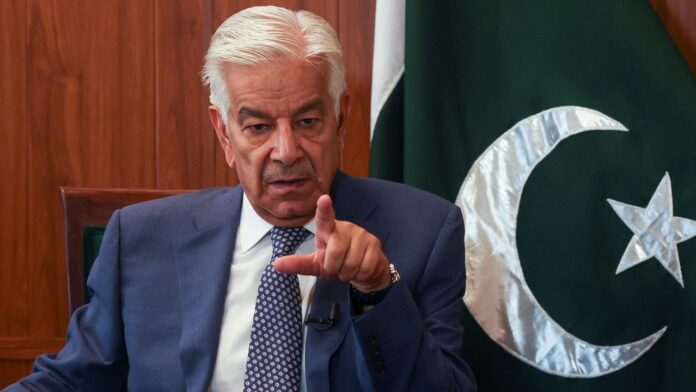Defence Minister Khawaja Asif has said that Pakistan must act as a “hard state” to curb extremism, declaring that religious extremist groups like the Tehreek-e-Labbaik Pakistan (TLP), formed in the name of religion, are unacceptable in any civilised country. His remarks came amid the Punjab government’s request to the federal authorities for a formal ban on the group following recent violent protests that left several people dead and dozens injured.
Speaking to Geo News, Khawaja Asif refrained from confirming whether the federal government was ready to impose an outright ban on the TLP but emphasised that the state must now enforce its writ without compromise. “We have to become a hard state,” he said, adding that groups resorting to violence and destroying public property cannot be tolerated in Pakistan.
The minister noted that it was “too late” as such groups had been nurtured for decades, saying, “Everyone knows who created them and for what purpose.” He asserted that, going forward, the state would function strictly according to the Constitution and law.
Responding to a question about Jamiat Ulema-e-Islam-Fazl (JUI-F) chief Maulana Fazlur Rehman, Asif said he respected him and would not comment on Fazl’s recent remarks about mobilising supporters toward Islamabad.
The TLP, which has previously staged violent demonstrations across Punjab, has once again come under scrutiny for inciting unrest. Following the chaos, Punjab Information Minister Azma Bokhari confirmed that the provincial cabinet had approved a summary recommending a ban on the TLP and that the federal government was expected to act within days.
Bokhari revealed that a special prosecution cell had been established to handle cases related to the Muridke incident and that strict measures would be taken against the TLP’s financiers. She disclosed that three civilians were martyred, 48 citizens injured, and 110 police officers wounded, including 18 by gunfire, during the clashes. Eight police vehicles were set ablaze and seized, while large quantities of weapons were recovered.
According to Bokhari, complete footage of the attacks had been recorded, and an organised online cell operated by the group had been spreading misinformation and threats against politicians and journalists. “Thirty-eight financiers who funded terrorist organisations have been identified, and their accounts frozen,” she stated, warning that anyone found aiding the TLP financially would face terrorism charges.
She clarified that the government’s crackdown was not against any sect or party but against extremist ideology. Bokhari said that 33 terrorism cases had been registered, 95 bank accounts linked to TLP chief Saad Rizvi sealed, and several TLP-run mosques and seminaries taken into government control.
“The state and the government are implementing all decisions regarding the TLP,” she said, adding that the group’s attempts to link its violent actions to the Palestine-Gaza issue were misleading. She reaffirmed that the government was not thinking about vote banks or elections but was committed to ensuring judicial action against those spreading extremism and violence.


